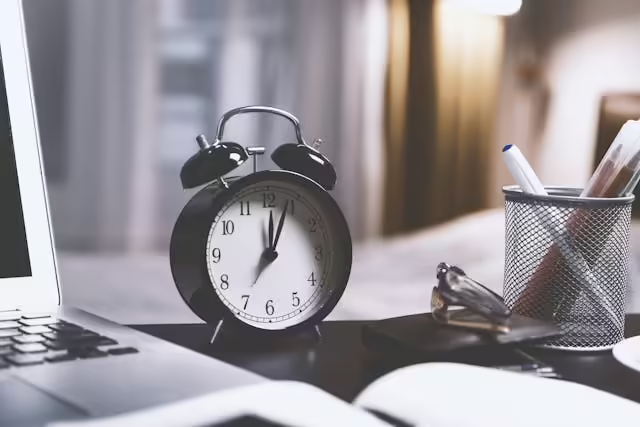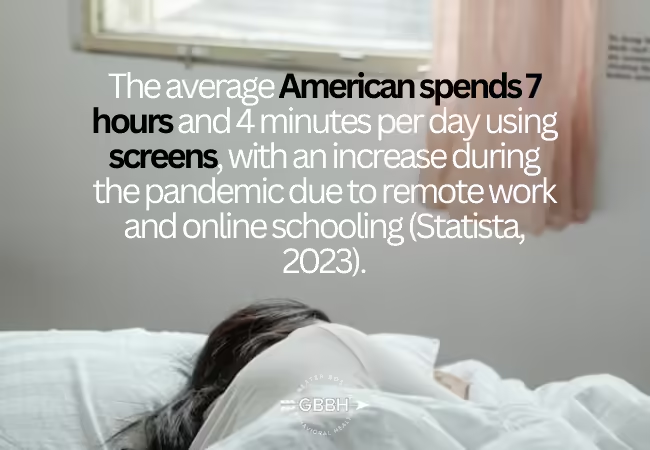In an era dominated by digital devices, screen time has become a central part of daily life. From work and education to socializing and entertainment, many people spend a substantial portion of their day in front of screens. While technology offers unparalleled convenience and connectivity, excessive screen use can negatively impact mental health, leading to heightened anxiety, depression, and emotional disconnection.
For individuals in Boston, mental health programs such as an Anxiety Treatment Program, Depression Treatment Program, or structured care through Intensive Outpatient Programs (IOPs) or Partial Hospitalization Programs (PHPs) at a Mental Health Treatment Center in Boston can address these challenges and provide effective solutions. This detailed guide explores the link between screen time and mental health, the potential risks of overuse, and actionable strategies for achieving a healthier relationship with technology.
The Prevalence of Screen Time in Modern Life
Screen time has become a cornerstone of daily life for individuals of all ages, as technology plays a central role in work, education, communication, and entertainment. With digital devices readily available, the amount of time spent in front of screens has increased significantly over the past decade. While technology offers convenience and connection, it also raises concerns about its potential impact on mental and physical health.
1. The Scope of Screen Usage
- Adults: The average adult spends 7-10 hours per day using screens for activities such as work, social media, and streaming content. Remote work and virtual meetings have further increased this usage.
- Teens and Children: Teens spend an average of 7.5 hours daily on screens outside of schoolwork, while children aged 8-12 average 4.5 hours per day. Many of these hours are devoted to social media, gaming, or online entertainment.
- Work and Education: The shift to remote work and online learning has normalized extended periods of screen use, with many professionals and students spending 6-8 hours on devices each day.
2. Key Contributors to Screen Time
- Social Media Platforms: Social media accounts for a significant portion of screen time, with individuals spending an average of 2.5 hours daily on platforms like Instagram, TikTok, and Facebook.
- Streaming Services: On-demand streaming services like Netflix and YouTube have created a culture of binge-watching, often leading to prolonged sessions of uninterrupted viewing.
- Gaming and Digital Entertainment: Video games and immersive virtual platforms are a growing source of screen engagement, particularly for younger demographics.
- News and Information: Instant access to news feeds and real-time updates keeps many individuals tethered to their screens throughout the day.
3. The Benefits and Risks of Screen Time
Benefits:
- Increased connectivity with family and friends through video calls and social media.
- Access to educational resources and online learning platforms.
- Opportunities for remote work and virtual collaboration.
Risks:
- Excessive screen use contributes to mental health challenges, such as anxiety, depression, and social isolation.
- Prolonged screen time often disrupts sleep patterns and reduces physical activity.
- The constant presence of screens can lead to addictive behaviors, such as compulsive scrolling or gaming.
Balancing screen time is essential for maintaining mental health and fostering a healthier relationship with technology.
The Connection Between Screen Time and Mental Health
While technology can enhance certain aspects of life, excessive or unregulated screen use often correlates with negative mental health outcomes. Understanding these risks is key to mitigating their impact.
1. Heightened Anxiety
- Social Media Comparisons: Seeing curated and idealized depictions of others’ lives fosters feelings of inadequacy, self-doubt, and anxiety.
- Fear of Missing Out (FOMO): Constant connectivity amplifies the pressure to stay informed and socially engaged, leading to stress.
- Overexposure to News: Continuous updates, particularly during crises, can create a sense of helplessness and exacerbate anxiety symptoms.
2. Increased Risk of Depression
- Isolation and Loneliness: Excessive screen time often replaces meaningful in-person interactions, leading to feelings of social disconnection.
- Negative Content: Exposure to cyberbullying, hate speech, or distressing images can contribute to depressive symptoms.
- Sleep Disruption: The blue light emitted by screens interferes with melatonin production, disrupting sleep patterns and worsening mood disorders.
3. Decreased Focus and Productivity
- Digital Multitasking: Constantly switching between apps, emails, and tasks reduces concentration and increases cognitive fatigue.
- Addictive Behaviors: Endless scrolling or gaming can create compulsive habits that detract from daily responsibilities and goals.
4. Physical and Emotional Fatigue
- Eye Strain and Headaches: Prolonged exposure to screens often results in discomfort, blurred vision, and headaches.
- Postural Problems: Poor ergonomics during screen use can lead to chronic neck and back pain, further affecting emotional well-being.
- Sedentary Lifestyle: Reduced physical activity due to screen overuse contributes to poor mental health by limiting the release of mood-enhancing endorphins.
Balancing Screen Time to Support Mental Health
Finding a balance between technology use and mental well-being is essential for improving emotional, cognitive, and physical health. These strategies can help you reduce the negative effects of screen time and foster a healthier relationship with technology.
1. Set Boundaries and Limits
- Implement Screen-Free Zones: Designate certain areas in your home, such as the dining room or bedroom, as screen-free spaces to encourage mindfulness and better sleep.
- Follow the 20-20-20 Rule: Every 20 minutes, look at something 20 feet away for 20 seconds to reduce eye strain and mental fatigue.
- Schedule Breaks: Set alarms or reminders to take regular breaks from screens, particularly during work or study sessions.
2. Prioritize In-Person Interactions
- Plan Social Activities: Meet friends or family in person to strengthen emotional connections and reduce loneliness.
- Engage in Group Therapy Programs: Group therapy can provide valuable peer support and encourage meaningful discussions.
- Join Clubs or Hobbies: Participate in activities that emphasize offline engagement, such as sports, art, or volunteering.
3. Manage Social Media Usage
- Set Time Limits: Use built-in device settings or third-party apps to limit time spent on social media platforms.
- Curate Your Feed: Unfollow accounts that contribute to negativity or unrealistic comparisons and focus on uplifting, supportive content.
- Take Digital Detoxes: Commit to regular intervals without social media to reset your mental and emotional state.
4. Replace Screen Time with Healthy Activities
- Engage in Physical Exercise: Regular workouts, even short walks, can improve mood and reduce stress.
- Practice Mindfulness: Activities like meditation, yoga, or journaling can help you stay present and manage anxiety.
- Explore Creative Outlets: Drawing, writing, or playing an instrument offers a productive and enjoyable alternative to screens.
5. Seek Professional Mental Health Support
If screen time is significantly affecting your mental health, consider reaching out for professional care.
- Anxiety and Depression Treatment Programs: Specialized programs can address screen-related mental health challenges, including social media anxiety and digital overload.
- Family Therapy Programs: Collaborative therapy helps families establish healthier technology boundaries and address conflicts related to screen use.
- Intensive Outpatient Programs (IOPs) and Partial Hospitalization Programs (PHPs): Structured care provides comprehensive support for those needing more intensive intervention.
The Role of Professional Support
Excessive screen time and its associated mental health impacts often require more than self-help strategies to address. Professional support provides individuals with the tools and resources necessary to navigate the challenges of screen overuse and its effects on mental health. Seeking guidance from qualified mental health providers can help individuals create sustainable habits and address underlying concerns.
1. Identifying Underlying Mental Health Conditions
Excessive screen time may be a symptom of deeper issues, such as:
- Anxiety Disorders: Social media comparisons, FOMO (fear of missing out), and information overload can exacerbate anxiety.
- Depression: Isolation, reduced physical activity, and exposure to negative content online can contribute to depressive symptoms.
- Trauma: Distressing or triggering online content may intensify trauma responses.
Mental health professionals assess these conditions and develop personalized treatment plans to address both the causes and effects of screen-related mental health challenges.
2. Personalized Treatment Approaches
Professional support tailors interventions to each individual’s needs, combining evidence-based techniques with practical strategies to reduce screen-related stress. Common approaches include:
- Cognitive-Behavioral Therapy (CBT): Helps individuals reframe negative thought patterns associated with screen use and develop healthier habits.
- Trauma Therapy Programs: For those who have experienced online harassment, cyberbullying, or exposure to distressing content, trauma-focused care provides tools for processing these experiences.
- Family Therapy Programs: Addresses conflicts related to technology use within families and fosters better communication and boundary-setting.
- Group Therapy Programs: Provides a supportive environment where individuals can share experiences and learn from others facing similar challenges.
3. Structured Programs for Comprehensive Support
For individuals experiencing significant mental health challenges due to screen overuse, structured programs offer intensive care:
- Intensive Outpatient Programs (IOPs): Provide regular therapy sessions and support while allowing individuals to maintain their daily routines.
- Partial Hospitalization Programs (PHPs): Offer more intensive care with daily therapeutic interventions for those needing focused support.
These programs equip individuals with coping strategies, time management skills, and a deeper understanding of their relationship with technology.
4. Long-Term Benefits of Professional Support
- Improved Mental Health: Reducing screen-related stress can alleviate symptoms of anxiety and depression, leading to improved emotional well-being.
- Stronger Relationships: Establishing healthier screen time boundaries fosters better communication and connection with loved ones.
- Enhanced Productivity: By addressing digital multitasking and addictive behaviors, professional support can help individuals regain focus and efficiency.
- Balanced Lifestyle: Therapy and structured programs teach sustainable habits that promote physical health, mental clarity, and overall quality of life.
How Greater Boston Behavioral Health Can Help
At Greater Boston Behavioral Health, we understand the impact of screen time on mental health and provide comprehensive care to help individuals achieve balance and well-being. Our services include:
- Anxiety and Depression Treatment Programs: Addressing mental health challenges linked to screen overuse.
- Trauma Therapy Programs: Supporting individuals affected by distressing online content or experiences.
- Family Therapy Programs: Helping families navigate conflicts related to technology and build healthier habits.
- Group Therapy Programs: Providing a space for connection and shared strategies to manage screen-related stress.
- Intensive Outpatient Programs (IOPs) and Partial Hospitalization Programs (PHPs): Structured care for individuals needing focused support.
Final Thoughts
Screen time is an inescapable part of modern life, but its impact on mental health must not be overlooked. Professional support is essential for addressing the underlying effects of excessive screen use and creating healthier, more balanced habits. Whether through therapy, structured programs, or family-focused care, individuals can reclaim control of their technology use and foster improved mental well-being.
If screen time is affecting your mental health or the health of a loved one, Greater Boston Behavioral Health is here to help. Contact us today at (888)278-0716 to learn more about our programs and begin your journey toward healthier, more balanced screen use and improved mental well-being.
FAQs on Screen Time and Mental Health
How does excessive screen time affect mental health?
Excessive screen time can increase anxiety, depression, and stress. It disrupts sleep, reduces in-person interactions, and fosters feelings of isolation or inadequacy through social media comparisons.
What are the signs that screen time is negatively impacting mental health?
Signs include:
- Increased irritability, anxiety, or sadness.
- Difficulty concentrating or completing tasks.
- Physical symptoms such as eye strain, headaches, or poor posture.
- Avoidance of social interactions or reduced physical activity.
How can I balance screen time for better mental health?
Strategies include:
- Setting screen-free zones and times.
- Prioritizing in-person activities and social interactions.
- Limiting social media use and curating uplifting content.
- Replacing excessive screen time with hobbies or exercise.
What is the link between social media and anxiety?
Social media fosters anxiety by promoting comparisons, creating pressure to stay connected, and exposing users to distressing content. Fear of missing out (FOMO) further exacerbates feelings of inadequacy and stress.
How can professional support help with screen-time-related mental health issues?
Mental health professionals provide personalized strategies to manage screen-related stress. Programs like Anxiety Treatment and Depression Treatment help address underlying conditions, while family and group therapy foster healthier technology habits.


